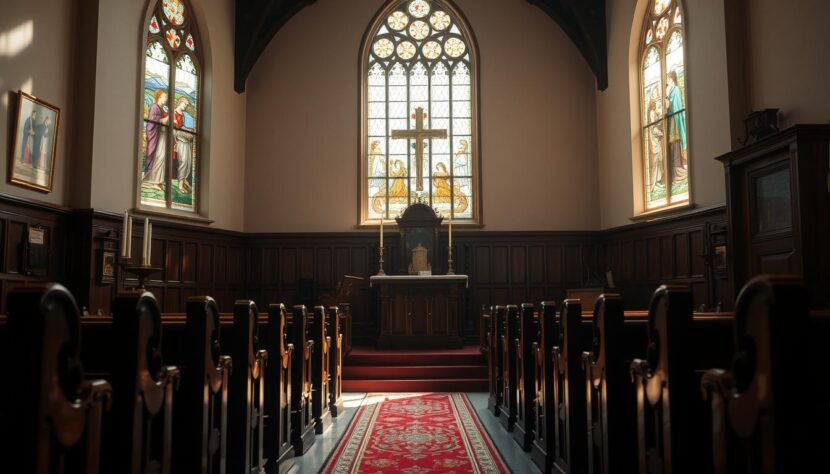The Episcopal Church is a key part of the Anglican Communion. It has a rich mix of beliefs and traditions. This guide will help you understand the Episcopal Church’s values, structure, and how it engages with the community.
It shows how the church balances scripture, tradition, and reason. About 70% of the Book of Common Prayer comes from the Bible. This shows the church’s strong foundation in scripture1.
The Book of Common Prayer is a symbol of unity for different congregations. It covers important parts of faith, like the catechism on pages 845-8621. This guide will show you key elements, rituals, and ways to get involved. It highlights the church’s focus on community and inclusivity.
Key Takeaways
- The Episcopal Church emphasizes a balance of scripture, tradition, and reason.
- Approximately 70% of the Book of Common Prayer is derived from the Bible.
- Inclusivity is a hallmark of the church’s leadership structure.
- Worship includes the use of Creeds, such as the Apostles’ and Nicene Creeds.
- The catechism educates individuals on foundational truths of Christian faith.
- Community engagement is a vital part of the church’s mission.
- Volunteer opportunities abound for those looking to get involved.
What is the Episcopal Church?
The Episcopal Church is part of the Anglican Communion. It has a rich history starting in 1789 after the American Revolution. This marked its separation from the Church of England, allowing it to grow in the U.S2..
It aims to be a “middle way” between Roman Catholicism and Protestantism. The church has a unique structure where both clergy and laity make decisions. This promotes inclusivity2.
Historical Background
The Episcopal Church has seen many important moments. It has about 2.5 million members in the U.S. and 85 million worldwide. This makes it a key part of the Anglican Communion, the third-largest Christian group32.
Events like the Lambeth Conference, held every ten years, guide the church. This shows its commitment to tradition and modernity.
Core Beliefs and Values
Episcopal beliefs focus on sacraments and scripture. About 90% of members see the Bible as key for salvation3. The church values inclusiveness, allowing both genders to be bishops and clergy2.
70% of Episcopalians believe in practicing their faith through community involvement3. The Book of Common Prayer is central to worship. It offers a structured approach to enriching the sacramental life of its members3.
| Statistics | Percentage |
|---|---|
| Members identifying as liberal | 45% |
| Members identifying as moderate | 35% |
| Members identifying as conservative | 20% |
| Congregations involved in community service | 60% |
| Weekly worship attendance | 80% |
| Members over the age of 50 | 65% |
The Structure of the Episcopal Church
The Episcopal Church has a clear episcopal hierarchy that focuses on teamwork. Bishops lead as spiritual guides over dioceses nationwide. Priests and deacons, part of the episcopal clergy, carry out the church’s mission locally. Laypeople also play a big role in episcopal governance, making sure everyone has a say.
Hierarchical Organization
The church’s leadership meets every three years at the General Convention. This gathering has two parts: the House of Bishops and the House of Deputies4. The House of Bishops meets yearly but doesn’t make laws then4. The House of Deputies has both lay and clerical members from each area4.
The church has many groups, like the Board for Transition Ministry and the Church Pension Fund Board4. This shows the church’s detailed structure.
Roles of Bishops and Clergy
Bishops are more than spiritual leaders; they guide their dioceses. They work with the episcopal clergy to follow church rules. Clergy do many things and must fit the church’s mission while meeting local needs5.
In 2023, the Episcopal Church had about 1,503,817 members in the U.S. and 6,754 parishes5. This shows how leaders and members work together to shape the church’s future.
The Episcopal Church’s Liturgy
The Episcopal Church’s liturgy is the heart of its spiritual life. It includes traditions and practices that guide worship. The Book of Common Prayer is key, providing language for worship and uniting congregations in shared beliefs.
Overview of Worship Services
Sunday is the main day for worship in the Episcopal Church. The Holy Eucharist, or Lord’s Supper, is the central service6. Services include prayers, scripture readings, hymns, and the Holy Eucharist, inviting all baptized to communion6.
The congregation recites the Nicene Creed, a statement of faith from the Fourth Century6. This highlights the church’s unity.
The Book of Common Prayer
The Book of Common Prayer is crucial for the Episcopal Church’s liturgy. It offers texts and prayers for individual reflection and communal worship7. It shapes the church’s mission and identity through its framework of actions, words, symbols, and rituals7.
This framework enables collective participation in the church’s life, especially during the Eucharist. It tells the story of faith and deepens worshipers’ relationship with God7.
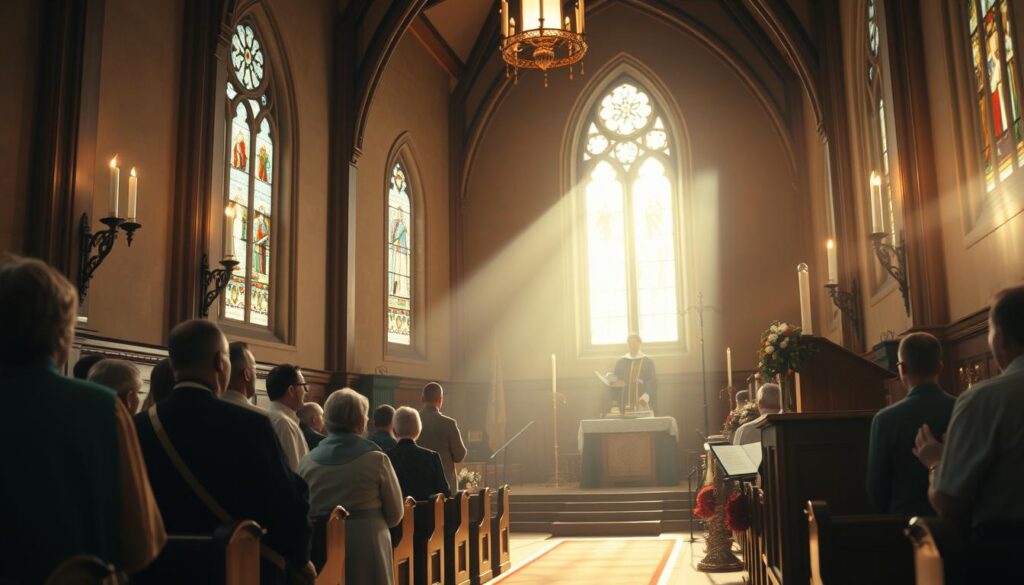
| Liturgical Components | Description |
|---|---|
| Prayers | Used throughout the service, engaging the congregation in speaking to God collectively. |
| Readings | Typically includes an Old Testament passage, a Psalm, an Epistle, and a Gospel reading during services. |
| Hymns | Sung by the congregation to enhance the worship experience and foster community. |
| Eucharistic Prayer | A narrative encompassing creation, Israel, and the ministry of Jesus Christ, integral to the divine worship experience. |
| Communion | All baptized Christians may receive, with non-baptized visitors invited to receive a blessing. |
Episcopalian Theology
Episcopalian theology focuses on Jesus Christ’s life, death, and resurrection. It sees these events as key to understanding salvation. The church views the Bible, tradition, and reason as equally important, creating a balanced faith approach.
This mix helps people delve into their spiritual journeys. It does so under the guidance of episcopal doctrine.
Understanding Jesus and Salvation
The Episcopal Church believes in one God, a Trinity of Persons: Father, Son (Jesus Christ), and Holy Spirit8. It teaches that salvation comes from Jesus Christ. All baptized Christians are encouraged to join in Holy Communion, showing unity with Christ.
Personal faith and community experiences shape one’s view of salvation. This is shown through various worship practices.
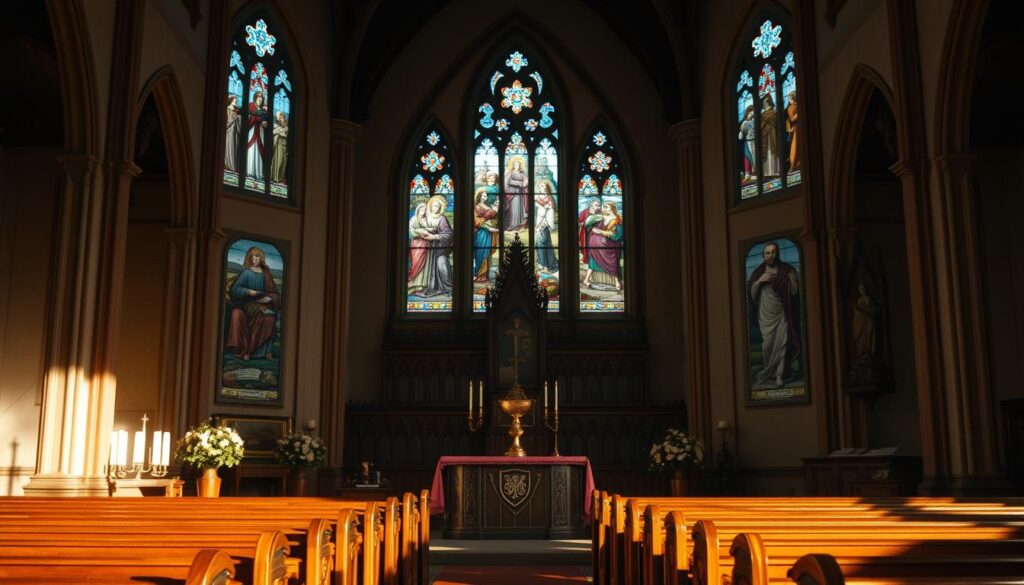
The Episcopal Church values tradition highly. It says worship elements have been kept for nearly 2,000 years. The sacraments are seen as signs of spiritual grace, linking the physical and spiritual worlds9.
In the Eucharist, bread and wine symbolize Christ’s presence. This leads to a shared prayer, drawing believers closer to the divine9.
The Role of Tradition
Tradition is crucial in Episcopal theology. The church uses historical creeds to guide its beliefs. Congregations welcome people from all walks of life, showing inclusivity10.
This focus on community and shared faith strengthens the understanding of salvation. It is shaped by the church’s traditions and practices.
Episcopalians engage with both old and new theological ideas. They navigate faith’s complexities while valuing tradition’s role in their beliefs.
Diversity within the Episcopal Church
The Episcopal Church welcomes people from many cultures, showing its dedication to diversity. It has members of all ages, genders, and ethnicities. This diversity makes the church stronger.
Women make up 54% of its members. Only 4% are African-American, and 90% of adults are white11. This is different from the U.S. population, which is mostly white11.
Cultural Varieties
The church works hard to be inclusive. It values different faith expressions. Episcopal schools focus on diversity and inclusivity, making sure all students feel welcome12.
This effort is crucial for young people. Only 8% of members are under 30, but they make up 22% of the U.S. population11.
Inclusivity and Social Justice
Inclusivity is key to the Episcopal Church’s mission. It fights for social justice. But, new laws might make this harder12.
Despite these challenges, the church believes in DEI initiatives. It sees them as essential for creating supportive environments. This ensures everyone’s voice is heard12.
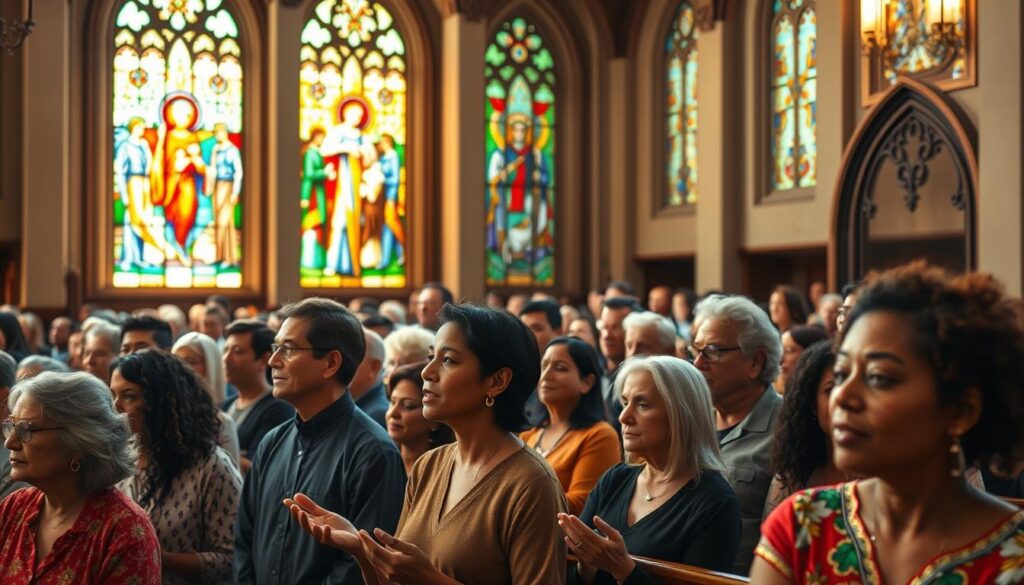
The church’s outreach programs focus on social justice. They show God’s love by fighting for equality. Members come from all educational backgrounds, from high school to post-graduate degrees13.
The Episcopal Church and Community Engagement
The Episcopal Church is key in helping communities through outreach. It tackles social justice, education, and helps those in need. Episcopalians are urged to join in community service and volunteer work that shows their values.
Outreach Programs
The Episcopal Church works with groups like the Poor People’s Campaign to tackle big issues. In 2021, churches focused on food justice, immigration, and housing14. The “From the Pew to the Public Square” initiative helps churches lead in making a difference14.
Volunteer Opportunities
Episcopal parishes have volunteer chances for members to help out. The Parish Election Challenge is coming to get people ready for the 2024 election15. The church also supports mental health training and community awareness, showing its dedication to societal issues14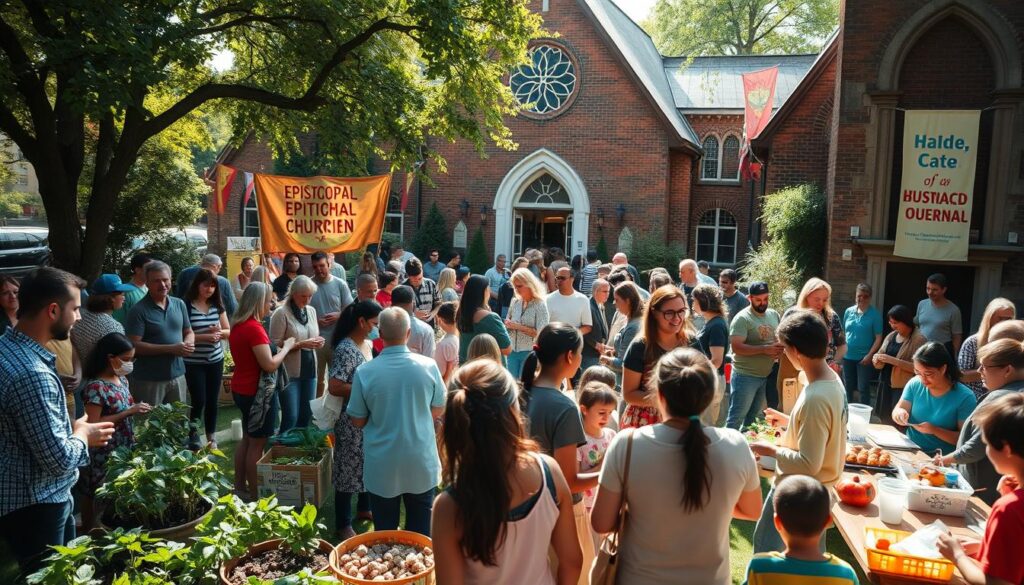
Episcopalian Education and Formation
Education is key in the Episcopal Church, helping members grow spiritually. It offers chances for all ages to learn and connect. Youth and adult programs help everyone understand faith and leadership better.
Sunday School and Youth Programs
Sunday School and youth programs are essential. They teach important values like empathy and civic duty. Episcopal schools mix faith with learning, encouraging students to help others.
For example, they help the Red Cross and visit the elderly. This shows respect for others and follows the Baptismal Covenant16.
At the 2024 Biennial Conference, educators shared valuable insights. They talked about improving Episcopal education and formation17. This helps young people grow and serve their communities17.
Adult Education
Adult education in the Episcopal Church covers many topics. It includes theological studies and leadership training. Episcopal seminaries offer degrees, blending worship and community life into learning.
They prepare people for ordained or lay leadership roles18. This training is vital for effective ministry today. Virginia Theological Seminary is a great example, offering education since 182318.
Traditions and Rituals in the Episcopal Church
The Episcopal Church has many practices that mark important life events. These traditions highlight spiritual connection and community during moments like baptism, confirmation, marriage, and funerals. Each ceremony holds deep meaning, showing both personal faith and the church’s unity.
Baptism and Confirmation
Baptism is a key rite of passage, open to both adults and infants. Most baptisms use water sprinkling, symbolizing joining the faith community19. Confirmation is a reaffirmation of faith, mainly for youth around 16 and adults baptized before. It shows personal commitment and strengthens ties to the church.
Marriage and Funerals
Marriage in the Episcopal Church is seen as a sacred bond between partners. Funerals are also crucial, offering comfort and support during loss. They can happen in the church or a funeral home, following the Book of Common Prayer. This shows how church rituals help people through life’s big changes, reminding them of the church’s support19.
Celebrating Episcopal Holidays
The Episcopal Church invites its members into a world of traditions and celebrations. These are based on its liturgical calendar. This calendar helps guide the faithful through different church seasons and festivals.
Major Feasts and Festivals
Significant feasts shape the worship rhythm in the Episcopal Church. Some key ones are:
- Advent: This season has four Sundays before Christmas, starting between November 27 and December 320.
- Christmas: On December 25, it celebrates Jesus Christ’s birth20.
- Epiphany: On January 6, it’s 12 days after Christmas20.
- Lent: A 40-day season (excluding Sundays) starts on Ash Wednesday, which changes each year21. It’s key for those preparing for baptism, leading to Easter.
- Easter: Celebrated between March 22 and April 25, it marks Christ’s resurrection. It’s followed by a 50-day Easter season until Pentecost22.
- Pentecost: 50 days after Easter, it remembers the Holy Spirit’s descent20.
- All Saints’ Day: On November 1, it honors all saints and is a time for baptism22.
The Liturgical Calendar
The liturgical calendar gives structure to these celebrations. It enriches spiritual practices through the church seasons. Each season, like Advent and Easter, has its own themes and reflections.
Advent is about waiting, while Easter is about renewal. The calendar also has cycles tied to Easter, like Ash Wednesday, which can be between February 4 and March 1020. The Christmas season lasts 12 days, ending on January 522.
How to Get Involved with the Episcopal Church
Want to join the Episcopal Church? Start by finding your local congregation. The church’s website and community directories can help you find nearby churches. These places are welcoming and open to everyone.
By joining in worship, outreach, and social events, you’ll feel part of the community. Many churches are inclusive, making it easy for newcomers to fit in.
Finding Your Local Congregation
After finding your local church, try attending services. You’ll see how the community works together. Baptized people from any Christian church can take Communion here, helping you connect with others23.
Being active in church helps you make friends and grow spiritually. The church encourages regular attendance and involvement.
Joining the Community
If you’re already baptized in the Episcopal Church, just show up to services and say you want to join. Confirmed members are asked to help out with time, talents, and money for church projects24. This helps you feel more connected to the church and its people.
FAQ
What are the core beliefs of the Episcopal Church?
How is the Episcopal Church structured?
What is the significance of the Book of Common Prayer?
How does the Episcopal Church engage with social justice issues?
What kinds of educational opportunities does the Episcopal Church offer?
What rituals are observed by the Episcopal Church?
How does the Episcopal Church celebrate its liturgical calendar?
How can someone get involved with the Episcopal Church?
Source Links
- What We Believe
- About the Episcopal Church
- What does it mean to be Episcopalian?
- Episcopal Church Structure and Organization
- Episcopal Church (United States)
- What to Expect at an Episcopal Church – The Episcopal Diocese of Upper South Carolina
- Liturgy
- What Do Episcopalians Believe? – The North Region of the Episcopal Diocese of Texas
- In Search of Eucharistic Theology in the Episcopal Church
- Trinity Episcopal Church
- Race and the Episcopal church: Too little, too late?
- Embracing Diversity and Inclusion: The Episcopal School Perspective | National Association of Episcopal Schools
- Religious Landscape Study
- Social Justice and Advocacy Engagement
- Election Engagement
- Episcopal Roots and Lionhearted Values – St. John’s Episcopal School | Pre-K 3 through 8th Grade Co-ed Independent School
- Episcopal Schools | National Association of Episcopal Schools
- Episcopal Seminaries
- Sacraments and Rites – St. Luke’s Episcopal Church
- Seasons & Holy Days — St. Andrew’s Episcopal Church — Elyria, Ohio
- Calendar of the Church Year
- Feast Days and Important Services – St Timothy’s Episcopal Church
- Join Us — The Episcopal Parish of St. John the Evangelist

